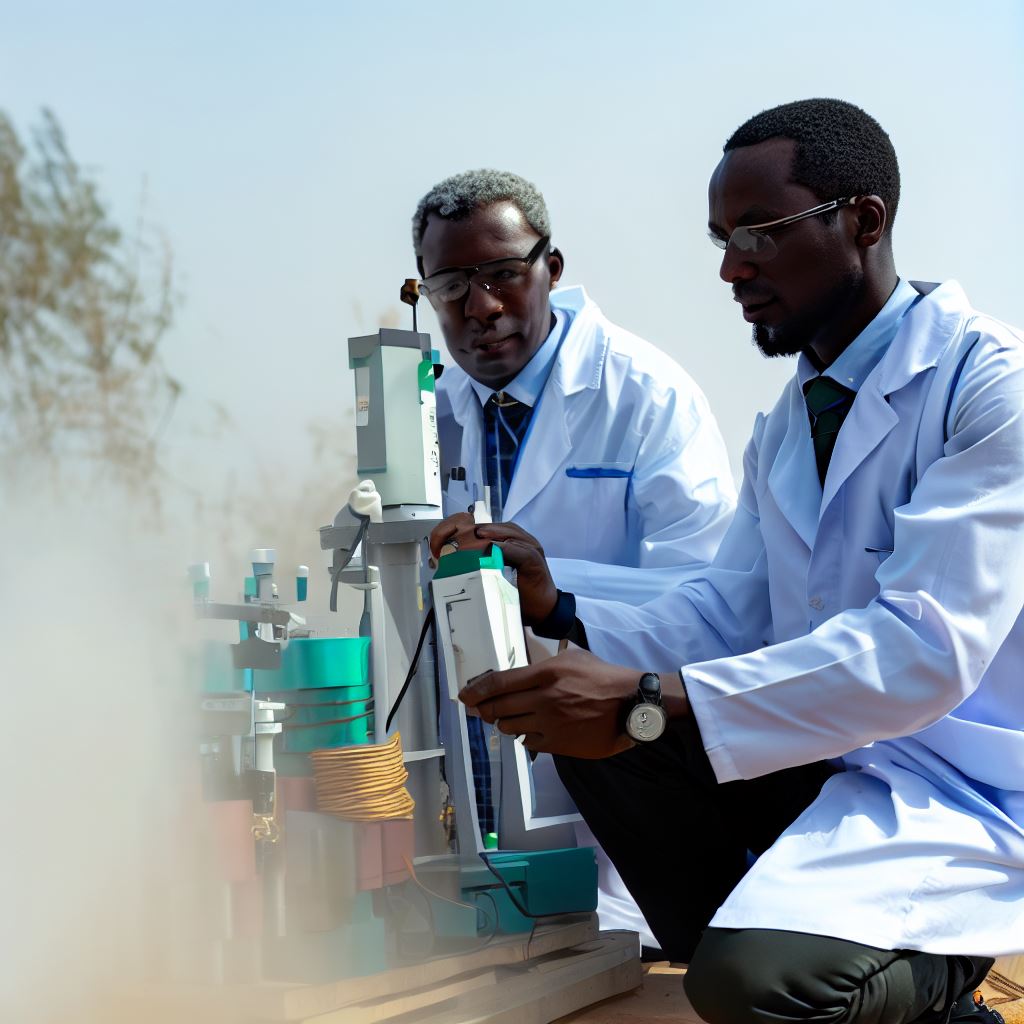Introduction
Nigeria’s leading atmospheric scientists are pivotal in comprehending weather patterns, agriculture, water management, and disaster preparedness.
In this blog section, we delve into their remarkable accomplishments and the pivotal roles they play in providing accurate weather forecasts.
Their expertise extends to optimizing water usage, benefiting both agriculture and daily life in water-scarce regions.
One of their crucial roles is predicting and preparing for natural disasters, such as floods or droughts, saving lives and minimizing damage during extreme weather events.
These scientists have been instrumental in developing early warning systems that have proven life-saving during critical situations.
Furthermore, their research significantly contributes to shaping climate change policies in Nigeria and worldwide.
Understanding their work’s profound impact helps us appreciate their influence on daily life and the global environment.
In the following sections, we will explore their achievements in-depth, their innovative projects, and the challenges they face in their pursuit of atmospheric knowledge.
Join us on this enlightening journey into the world of Nigeria’s top atmospheric scientists and the significant contributions they make to science, society, and the environment.
Read: Salary Insights: What Cartographers Earn in Nigeria
Background on Atmospheric Science in Nigeria
Brief history of atmospheric science in Nigeria
Atmospheric science in Nigeria dates back to the early 1960s when the country gained independence.
The Nigerian Meteorological Agency (NiMet) was established in 2003 to oversee weather forecasting and climate services.
Current state of atmospheric science research in Nigeria
Today, Nigeria has made significant strides in atmospheric science research. The country boasts several research institutions and universities with dedicated atmospheric science departments.
These institutions collaborate with international research organizations and contribute to global climate and weather studies.
Role of atmospheric scientists in monitoring, predicting, and mitigating environmental issues
Atmospheric scientists play a crucial role in Nigeria’s efforts to monitor and predict environmental issues such as climate change, air pollution, and extreme weather events.
They collect and analyze data to understand atmospheric patterns and develop models that help predict future climate scenarios.
Accurate predictions are crucial for informed decisions by policymakers, urban planners, and industries to mitigate environmental issues effectively.
Importance of collaboration and knowledge-sharing among atmospheric scientists
Collaboration and knowledge-sharing are essential for atmospheric scientists in Nigeria.
- Collaborating with global researchers allows them to exchange ideas, share data, and innovate solutions for environmental challenges.
- Additionally, collaboration enables atmospheric scientists to access more resources and funding, enhancing the quality and impact of their research.
- To facilitate collaboration, the Nigerian government encourages partnerships between research institutions and provides grants and support for collaborative projects.
In fact, Nigeria’s atmospheric science research has grown significantly since its inception.
The country’s atmospheric scientists play a vital role in monitoring, predicting, and mitigating environmental issues such as climate change and air pollution.
Collaboration and knowledge-sharing drive atmospheric science in Nigeria, fostering innovative solutions to environmental challenges.
Read: Trends in Actuarial Recruitment in Nigeria: What to Expect in 2023
Profiles of Nigeria’s Top Atmospheric Scientists
Professor Sani Abubakar Mashi: Background, Education, and Specialization
- Professor Sani Abubakar Mashi is a renowned atmospheric scientist in Nigeria.
- He has a strong background in meteorology and climate science.
- Prof. Mashi received his education from top institutions both in Nigeria and abroad.
- Throughout his career, he has made significant achievements and contributions to the field.
- His research has focused on understanding atmospheric dynamics and climate change patterns.
- Prof. Mashi has published numerous peer-reviewed articles and books, earning him international recognition.
- His work has had a profound impact on local communities and government policies.
- By studying the effects of climate change on agriculture, he has provided valuable insights to farmers.
- Prof. Mashi’s research has influenced the development of sustainable agricultural practices, benefiting the community.
Ekundayo Elisha Balogun: Background, Education, and Specialization
- Ekundayo Elisha Balogun is a prominent figure in Nigeria’s atmospheric science community.
- He has a diverse academic background, with expertise in meteorology and environmental science.
- Balogun’s education and training have equipped him with a deep understanding of weather patterns and climate dynamics.
- His achievements and contributions to the field are commendable and highly valuable.
- Balogun has conducted groundbreaking research on air pollution and its impact on health.
- His work has shed light on the sources and effects of pollution, leading to policy changes and environmental awareness.
- By engaging with local communities, Balogun has made a significant impact on public health.
- His efforts to raise awareness about air pollution and its health implications have prompted individuals to take action.
- Balogun’s research has also influenced government policies on reducing pollution levels and improving air quality.
Professor Babatunde Rabiu Ayoade: Background, Education, and Specialization
- Professor Babatunde Rabiu Ayoade is a highly respected atmospheric scientist in Nigeria.
- His academic background includes studies in meteorology and climate science.
- Prof. Ayoade’s education and specialization have paved the way for his significant contributions to the field.
- Over the years, he has achieved remarkable milestones and made notable contributions to atmospheric science.
- Ayoade’s research has focused on understanding climate variability and its impacts on agriculture.
- His findings have provided valuable insights into adapting agricultural practices to changing climate conditions.
- The impact of Prof. Ayoade’s research extends beyond academia.
- His collaboration with local farmers has helped them adopt climate-smart agricultural techniques.
- Furthermore, Prof. Ayoade’s work has influenced government policies on agricultural development and climate resilience.
In short, Nigeria is home to talented and dedicated atmospheric scientists who have made significant contributions to the field.
Prof. Sani Abubakar Mashi, Ekundayo Elisha Balogun, and Prof. Babatunde Rabiu Ayoade excel with research, publications, and community engagement.
Their work has had a lasting impact, influencing local communities and government policies.
These scientists continue to inspire future generations and contribute to the understanding and mitigation of climate change in Nigeria.
Read: Skills Needed to Thrive in Nigerian Cartography

Challenges and Opportunities for Atmospheric Scientists in Nigeria
Lack of funding and resources
Nigeria’s atmospheric scientists face an uphill battle due to the lack of funding and resources available to support their research endeavors
Without adequate financial backing, scientists struggle to acquire essential equipment and undertake projects that require substantial financial investments.
This lack of funding limits the scope and impact of their work, preventing Nigeria from making significant contributions to the global atmospheric science community.
Limited recognition and support from the government
Furthermore, atmospheric scientists in Nigeria often face limited recognition and support from the government.
The importance of their research in addressing climate change, natural disasters, and environmental pollution is often overlooked.
Scientists struggle to secure vital government support for groundbreaking research and effective policy implementation based on scientific findings.
Need for improved research facilities and equipment
Another challenge that hampers the progress of atmospheric science in Nigeria is the need for improved research facilities and equipment.
Many existing facilities do not meet the standards required for cutting-edge atmospheric research.
Outdated equipment and inadequate infrastructure hinder scientists from conducting accurate and comprehensive studies.
This limitation not only affects the quality of research but also prevents scientists from exploring new research avenues that require advanced tools and technologies.
The current state of research facilities and equipment in Nigeria falls short of the standards required for advanced atmospheric science studies.
Potential collaborations and partnerships
Enhancing Nigerian atmospheric science research through collaborations is a key opportunity. International partnerships offer technology access and data sharing.
Domestic collaborations strengthen knowledge exchange and resource sharing.
Engaging with government agencies, industries, and international organizations provides funding, real-world data, and regional cooperation.
Collaborations foster interdisciplinary approaches, capacity building, and mentorship, benefiting Nigeria’s atmospheric science community.
Despite the challenges, there are several opportunities for Nigerian atmospheric scientists to enhance research through collaborations and partnerships.
Read: How to Become a Cartographer in Nigeria: A Guide
Conclusion
In this section, we have explored and highlighted Nigeria’s top atmospheric scientists, who have made significant contributions to the field.
Their research and expertise help comprehend and mitigate issues like climate change, air pollution, and weather disasters.
It is crucial to recognize the importance of investing in atmospheric science research in Nigeria and providing adequate support to these scientists.
This support can enable them to make even greater strides in understanding and addressing environmental challenges.
By funding research initiatives, providing state-of-the-art facilities, and fostering collaborations, Nigeria can cultivate a robust community of atmospheric scientists.
Nigeria’s leading atmospheric scientists, with continued support, can establish the country as a global and African atmospheric science leader.
Government, organizations, and stakeholders must prioritize atmospheric science research, ensuring scientists receive essential resources to continue their work.
By doing so, Nigeria can proactively contribute to global efforts aimed at safeguarding the environment and securing a sustainable future.




